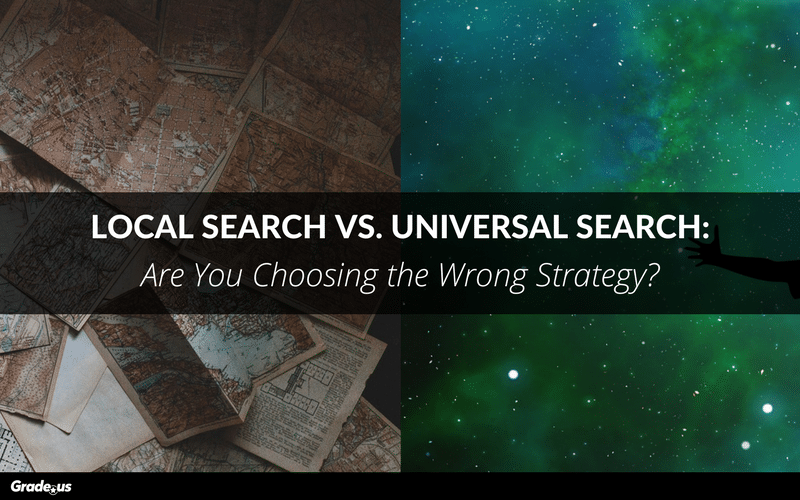Do you want it?
A steady stream of customers and sales from Google? A never-ending supply of leads, customers and sales for your local business? Who wouldn’t want that? It’s yours for the taking, if – you choose the right strategy.
Make the wrong decision and you can do a significant amount of harm to your business.
Okay, what decision are we talking about here?
We’re talking about your search strategy
When you’re looking for search engine traffic you have two options to work with.
-
- Universal search places an emphasis on optimizing for blended search results – SERPs that can include images, books, video, knowledge graph results, rich snippets, news updates, tweets, or reviews.
- Local search focuses on driving customers offline to a brick and mortar business. This strategy focuses on local sites, events, blended search results like local packs, knowledge panel, and reviews.
What would happen if a business chose the wrong strategy? Couldn’t be all that bad, could it?
Actually, yes.
If a local business decides to focus their attention, time and resources on universal search their “success” makes everything worse.
Why?
A local business needs to attract local customers (shocking, I know). The problem with universal search is the fact that it scoops visitors up indiscriminately.
Visitors, not customers.
Universal search casts a wide net, drawing anyone in if they use the right queries. If you’re attracting visitors outside of your service area, that’s a disaster in the making.
If a digital or non-local business relies on local search exclusively it’s death by starvation.
Their business starves slowly as they struggle to get the traffic, leads, sales they need to survive.
Start with goals to avoid the struggle
Local search is laser focused – it’s surgical and precise. Universal search, on the other hand, is a bomb of awesomeness. The results are dense and far reaching, which is perfect if you’re not focused on customers from a specific geographic location.
You’ll have to decide which strategy is best.
But how?
It’s simple. Start with your goals. Have a…
- Local business focused on local customers? You’re strategy is pretty obvious. Focus your attention on a local search strategy, using tactics that extend your influence and reach in your service area.
- Regional, national or non-local business? Use universal search to cast a wide net, attracting a large amount of customers from a variety of sources and channels.
- Running a business with multiple locations or focus areas? Use a mix of local and universal search to drive engagement and response. If you’re running a bricks and mortar business side by side with a digital offering, you’ll need to optimize for both using both universal and local search strategies. Create a clear delineation between the two, maintaining separation in your approach.
Have a goal in mind? Fantastic.
There’s a bit of overlap with each strategy so let’s break the tactics down for each.
Strategy #1: Local Search
When it comes to local results, Google offers two main options.
The local three pack, which lists three businesses.
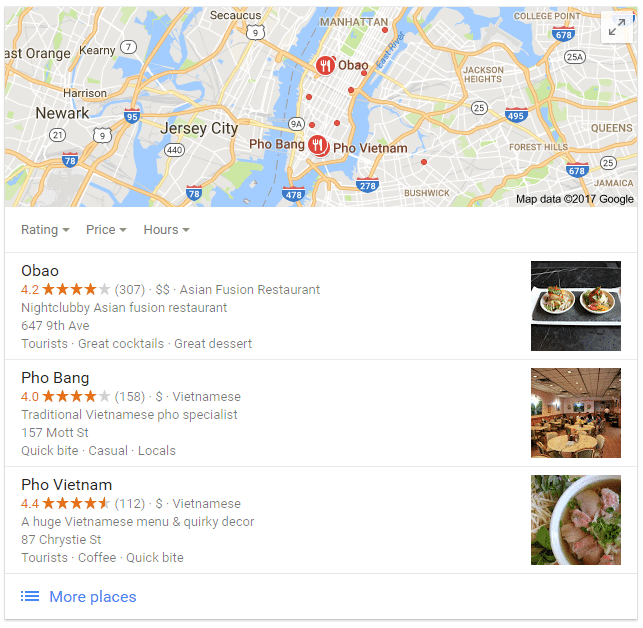
Here’s the problem. Google uses proximity to determine who makes it into the local pack. That makes ranking difficult if searchers aren’t in your area. To complicate things further, there’s a growing amount of ads in the local three pack and organic results. It’s harder to rank for these keywords but it’s not impossible as we’ll soon see. Then there’s…
The knowledge panel which focuses on one business specifically.
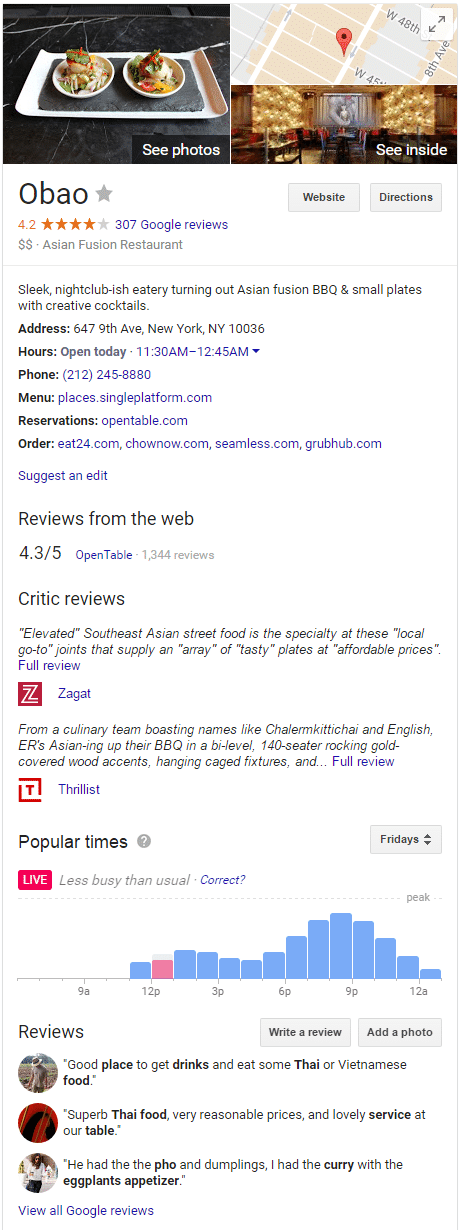
The three pack typically shows up for more generic searches (e.g. Vietnamese restaurants near me). The knowledge panel typically appears for very specific searches (e.g. Obao restaurant new york city).
Which local search tactics work best for locals?
-
- Find local and social profiles. You’ll want to find the tools that have the greatest impact in your industry or vertical. Restaurants depend on Yelp, Trip Advisor, Zomato. The key here is focusing on sites with a local emphasis.
-
- Register/claim profiles. Feed Google information about your business. Your name, address and phone number, hours of operation, website, social media profiles, etc. Track these profiles and keep them maintained.
-
- Build strong profiles and five star reviews. Reviews are powerful because they rank well for both branded and location-specific queries. This is huge because top ranked results get more clicks than listings without. Focus half of your local search efforts on getting reviews. Consistency is key here; work to consistently attract reviews. A positive review from a week ago is more valuable than one from 3 months ago.
-
- Participate in the community. If you’re a restaurant, register for local food fairs. If you’re an agency, focus on entrepreneur programs and events. Participate in workshops, meetups, seminars and events. This gives Google a sense of your standing in the community.
-
- Get locals to vouch for you via citations. Get links from .edus, Ask for reviews from powerful local influencers, Reach out to relevant or complementary non-profits, volunteer with local organizations. Share your activity via link building, PR, news reports and interviews. Focus your attention on serving so you don’t burn bridges.
-
- Create partnerships with local groups. Partner up with relevant local organizations. What if your local area doesn’t have a local organization to promote your interests? Create your own! Just make sure it serves the local community.
-
- List your business in local directories. Local directories with strong domain authority (e.g. Angie’s List, BBB, Facebook, Foursquare, CitySearch, etc.) help to boost local awareness of your brand.
-
- Use paid clicks to build local awareness. Piggyback on local searches, then present an irresistible offer to locals. A lead magnet, free offer, workshop or trial are great places to start.
-
- Rely on video and display to drive searches. Video and display ads drive search clicks after two weeks. A paid search campaign will entice customers to search for your business on Google, improving the odds of three pack and one box placement.
- Create high quality, hyper local content. Use trusted sources and authority domains to create and host local content. If you’re hosting your blog, focus your attention on building your domain’s trust and authority via link building from other trusted brands. Guest posting still has value if you’re able to point visitors/customers back to your site. Providing value for visitors = maximizing search value.
Did you catch it?
The factors that get you the coveted local three pack or one box? It isn’t simply about out-ranking your local competitors. It’s about outclassing them.
Becoming the de facto option in your local community. The smaller your city the easier for you to do.
Strategy #2: Universal Search
Sites with a strong universal ranking typically don’t have the local three packs we see with local businesses. What if they’re looking to target a local audience?
Which tactics would work best?
-
- Find the formats that matter most. Do customers in your niche or vertical prefer video? Are they looking for lots of images? Social media content via Facebook and Twitter? Figure out what your target audience wants, then create content that gives it to them.
-
- Create long form content. Focus your attention on creating quality content that’s deep and comprehensive. Create content that consistently addresses their desires, goals, fears and frustrations.
-
- Differentiate content with the right ingredients. There are four ways to create what Rand Fishkin calls “10x content.” (1.) Create content with depth (2.) differentiate with amazing, high quality design (3.) Create drama with stories and psychological triggers, or (4.) with data that’s proprietary, exclusive, surprising, thorough, or compelling.
-
- Split content up into a wide variety of formats. Use the four differentiation factors to double, triple or quadruple the performance of your 10x content. Create a long form blog post, then expand on your content with an embedded YouTube video from your channel. Post images and diagrams on Pinterest or Imgur. Create and share slides on SlideShare.
-
- Syndicate content across the web. Syndicate your posts via guest posting or contributor spots. Share to Medium and LinkedIn. Share content on niche forums like Reddit. Build quality backlinks from brands with strong domain authority focusing on a mix of follow/no-follow, authoritative, and fresh links.
-
- Tie all of your content together. Create lead magnets, incentives or offers to attract and convert customers. Tie all of your content together to bring customers into your sales funnel and marketing ecosystem.
-
- Filter and qualify customers. If you’re looking for local customers, use local channels to share your 10x content. If you’re casting a wide net, filter and qualify customers (e.g. via lead scoring or marketing automation) to maintain quality.
-
- Sort visitors into performance buckets. Use tools like BuzzSumo to identify visitors who are more likely to share and lead scoring or automation tools to identify potential customers. Provide Lurkers with incentives to engage, then let them sort themselves.
- Re-create top performers, improve poor ones. Universal search can’t survive without thorough, quality content. Learn from both top and poor performing content – identifying the who, what, why, where and how. Who read this? What did they think/do after reading this, where did they share it, how do I create more or refine what I have?
Even when it’s intended for a local audience, universal search depends on content.
Deep, comprehensive content.
The difference is the fact that this content is optimized around the channels that matter most to your target audience.
But what do these strategies look like in action?
Let’s search for some Greek food to find out.
When we enter the generic search query “greek restaurant chicago” we see the local pack.
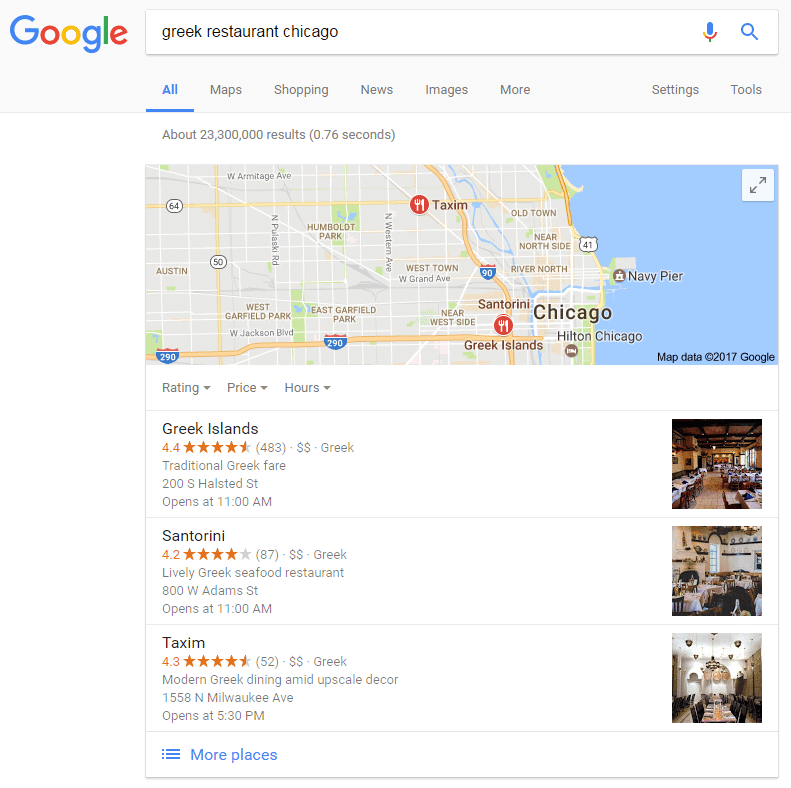
Greek Islands is at the top of the list. So let’s narrow our search a bit with the query “Greek Islands Chicago.”
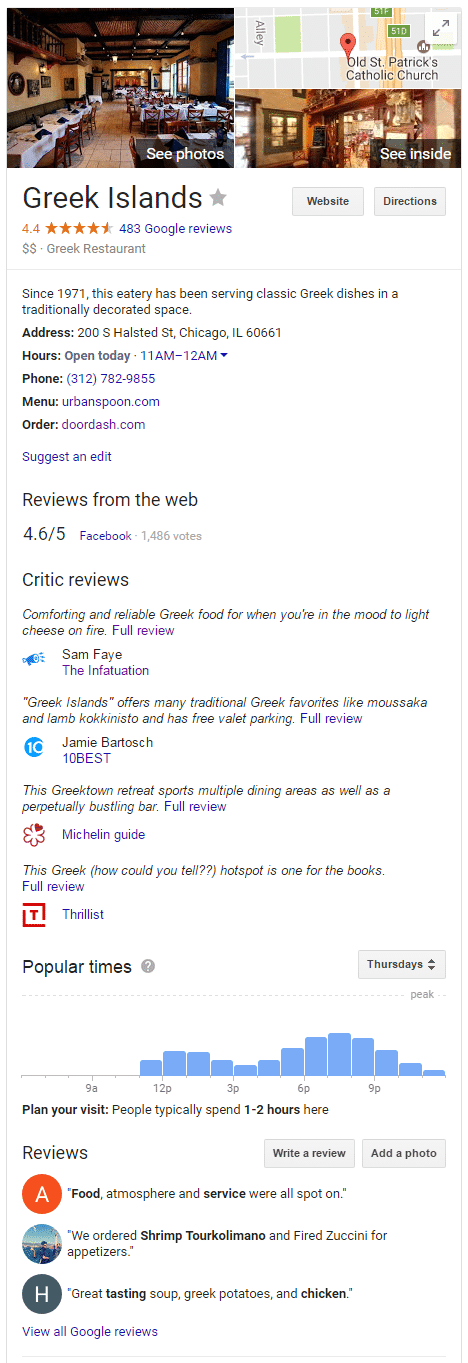
Aha! They have the coveted one box. But why?
Look again and the answer jumps out at us. They’ve completely outclassed their nearest competitor and not by a little bit.
They’re dominating.
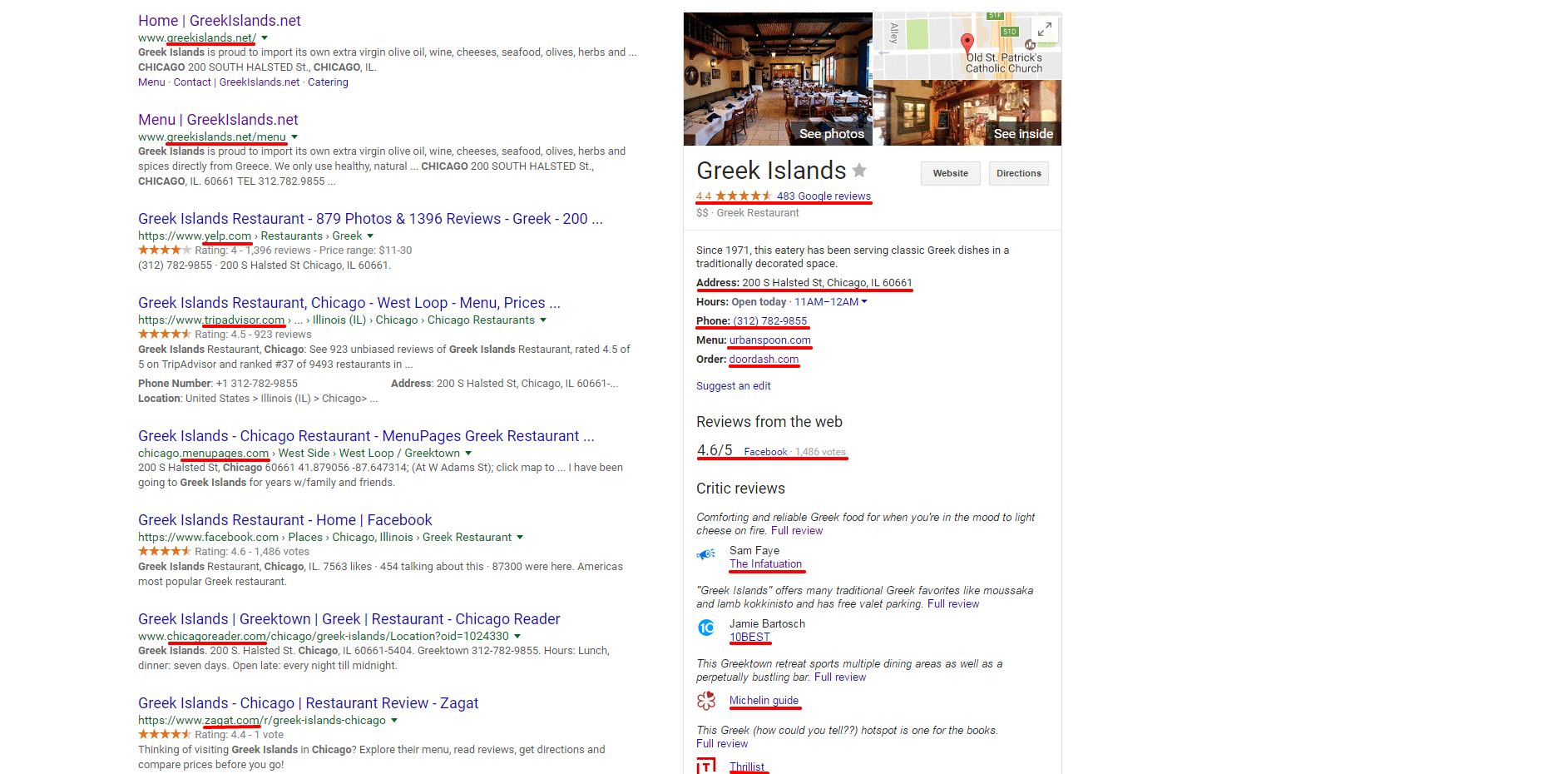
They’ve gone all-in on their local search strategy. They have…
- 879 photos and 1,396 reviews on Yelp with a four star rating.
- 923 reviews on Trip Advisor with a four and a half star rating.
- 1,486 votes on Facebook with an average rating of four point six stars.
- 486 reviews via Google Reviews with an average four and a half stars.
- They’re chock full of citations, being reviewed and listed on Menupages, Urbanspoon, DoorDash, OpenTable and Zagat.
- They’ve received (and continue to receive) media mentions and critic reviews from Chicago Reader, Thrillist, the Michelin Guide, 10BEST, The Infatuation, and quite a few more outlets.
- Their website has their NAP (name, address and phone), critical hallmarks for a local business, but aside from that it’s pretty bare bones.
- Their restaurant has its own Wikipedia entry.
Greek Islands shows up for both generic and branded search queries. They’ve received a lot of attention from Google. They’ve done the work, invested the time, and it shows.
They’ve earned it.
What about universal search?
To get a sense of this in action, let’s look at… Google. A quick search of the branded term “Google” displays blended results.
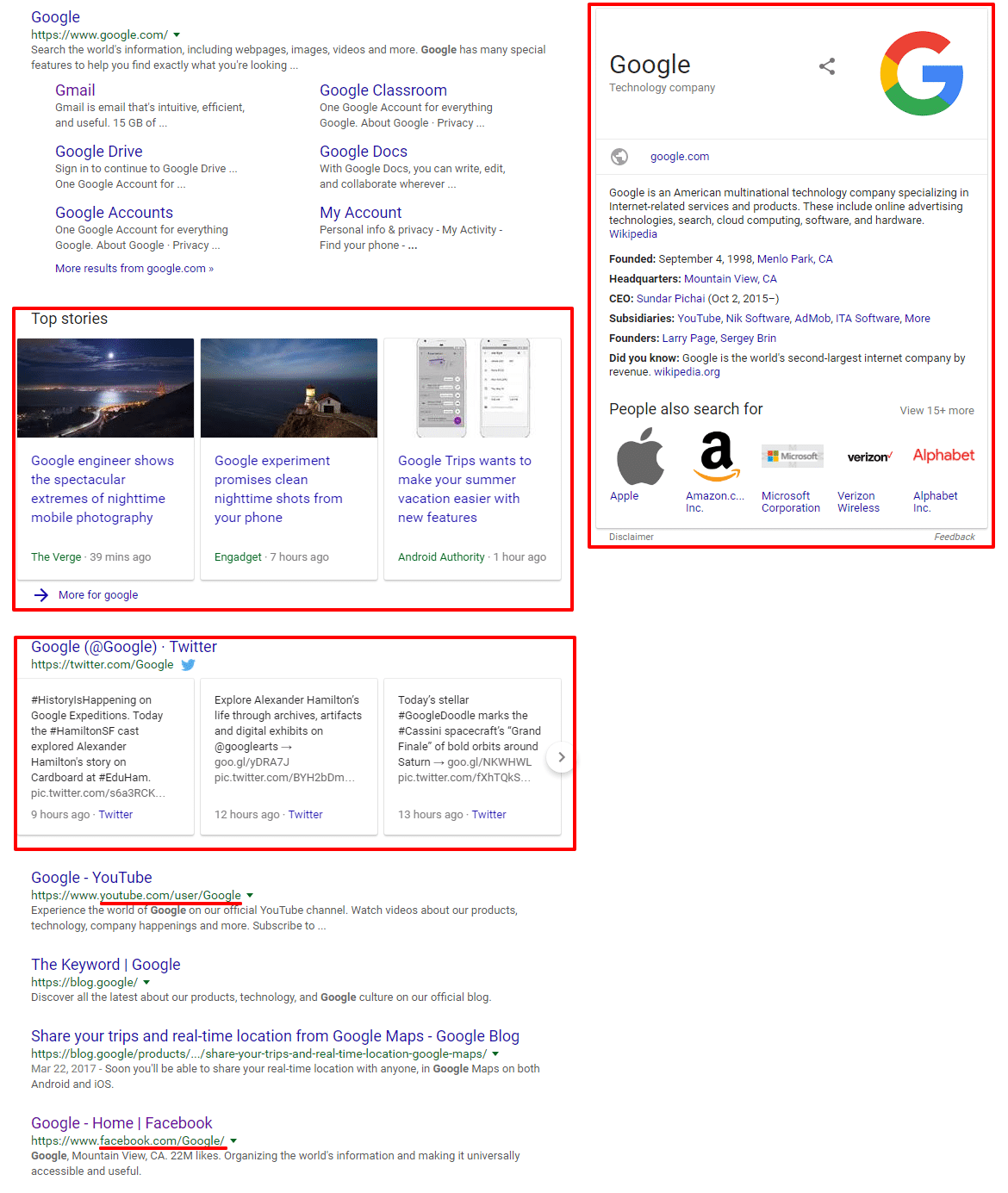
Google has created an ecosystem around their product. Each product provides users with deep comprehensive content that’s focused around a particular topic or product.
- Media outlets create deep, comprehensive content around the products in Google’s ecosystem.
- Google’s Twitter profile provides references and anchor points to their content.
- Google believes in Dogfooding; they create comprehensive content via their YouTube channels.
- Their Facebook page is filled with helpful and educational resources used to teach users about their products, services and even their values.
- Sitelinks lead users to deep content via Google Classroom as well as other apps and results like Think with Google.
You’re not Google but you can use universal search just as effectively.
Many businesses don’t.
But many businesses miss the secret behind these two strategies. Did you catch it?
Local search, universal search – they work best when they’re used together.
The Greek Islands used Local and universal search. 879 photos via Yelp. Deep, comprehensive content via amateur and professional reviewers. Content on Wikipedia, video features on the Food Network’s The Hungry Detective.
The Greek Islands blended local and universal search to maximize their results, and it worked like gangbusters.
What if these strategies backfire?
What can go wrong, will go wrong as they say. Review marketing, reputation management – these strategies go hand in hand with local search.
Build a quality business and you’ll reduce the backlash.
Focus your attention, time and resources on the details that matter most to customers, to you. Then, when things go wrong, be first, be kind, be helpful or you’ll be gone.
If these strategies backfire, these same strategies will be there to bail you out – if you’re a decent human being with a quality business.
You are, aren’t you?
That’s why you’ll get it…
A steady stream of customers and sales from Google and other search engines. A never-ending supply of quality customers and sales for your local business. It’s yours for the taking, if you make the right choice.
Make the wrong decision and you’ll do a significant amount of harm to your business.
Choose carefully, build a quality business.
Focus your attention, time and resources on that matter most. Local search is laser focused, surgical and precise; universal search, a far reaching bomb of awesomeness.
Choose the strategy that’s best for you and you’ll get the results you’re looking for.
You know you want it. 😉
About the Author
Andrew McDermott
Andrew McDermott is the co-founder of HooktoWin. He shows entrepreneurs how to attract and win new customers.

